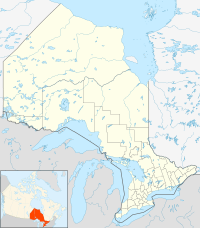Lac des Mille Lacs 22A1 facts for kids
Quick facts for kids
Lac des Mille Lacs 22A1
|
|
|---|---|
| Lac des Mille Lacs Indian Reserve No. 22A1 | |
| Country | |
| Province | |
| District | Thunder Bay |
| First Nation | Lac des Mille Lacs |
| Area | |
| • Land | 17.32 km2 (6.69 sq mi) |
| Population
(2021)
|
|
| • Total | 0 |
| • Density | 0/km2 (0/sq mi) |
Lac des Mille Lacs 22A1 is a special piece of land in northwestern Ontario, Canada. It is known as a First Nations reserve. This reserve is located right on the beautiful shores of Lac des Mille Lacs, a large lake. It is one of two reserves that belong to the Lac des Mille Lacs First Nation.
Contents
What is a First Nations Reserve?
A First Nations reserve is a piece of land set aside for the use and benefit of a specific First Nation. These lands are protected by the Canadian government. They are important places for First Nations communities to live, practice their culture, and manage their own affairs.
Location of Lac des Mille Lacs 22A1
This reserve is found in the Thunder Bay District of northwestern Ontario. It is situated on the shores of Lac des Mille Lacs. The lake itself is quite large and known for its many islands. The area is part of the vast Canadian Shield, which means it has lots of rocks, forests, and lakes.
How Big is the Reserve?
Lac des Mille Lacs 22A1 covers an area of about 17.32 square kilometers. To give you an idea, that's roughly the size of 1,732 football fields! It's a significant piece of land for the First Nation.
Who Lives on the Reserve?
According to the 2021 census, the population of Lac des Mille Lacs 22A1 was reported as zero. This means that, at the time of the census, no one was officially living on the reserve. Some reserves might not have permanent residents but are still important for cultural activities or other uses by the First Nation.
About the Lac des Mille Lacs First Nation
Lac des Mille Lacs 22A1 is one of two reserves belonging to the Lac des Mille Lacs First Nation. This First Nation is part of the Anishinaabe people, specifically the Saulteaux (also known as Ojibwe). They have a rich history and culture tied to the land and the lake.
Their Connection to the Land
The Lac des Mille Lacs First Nation has lived in this area for many generations. Their traditional territory includes the lake and surrounding lands. They have a deep connection to the environment, relying on its resources for hunting, fishing, and gathering. This connection is a vital part of their identity and way of life.
 | Jessica Watkins |
 | Robert Henry Lawrence Jr. |
 | Mae Jemison |
 | Sian Proctor |
 | Guion Bluford |


